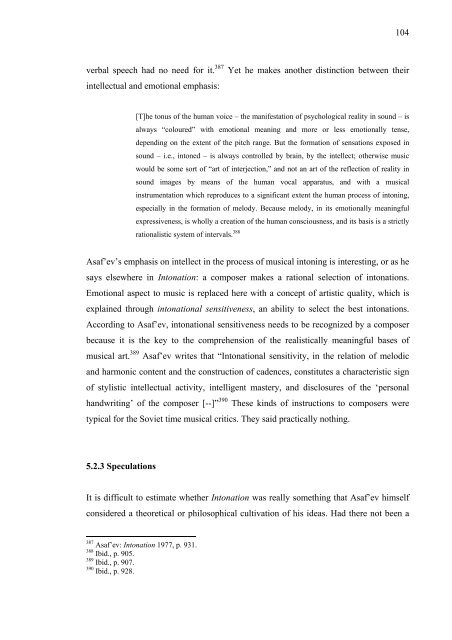Boris Asaf'ev and the Soviet Musicology - E-thesis
Boris Asaf'ev and the Soviet Musicology - E-thesis
Boris Asaf'ev and the Soviet Musicology - E-thesis
Create successful ePaper yourself
Turn your PDF publications into a flip-book with our unique Google optimized e-Paper software.
104<br />
verbal speech had no need for it. 387 Yet he makes ano<strong>the</strong>r distinction between <strong>the</strong>ir<br />
intellectual <strong>and</strong> emotional emphasis:<br />
[T]he tonus of <strong>the</strong> human voice – <strong>the</strong> manifestation of psychological reality in sound – is<br />
always “coloured” with emotional meaning <strong>and</strong> more or less emotionally tense,<br />
depending on <strong>the</strong> extent of <strong>the</strong> pitch range. But <strong>the</strong> formation of sensations exposed in<br />
sound – i.e., intoned – is always controlled by brain, by <strong>the</strong> intellect; o<strong>the</strong>rwise music<br />
would be some sort of “art of interjection,” <strong>and</strong> not an art of <strong>the</strong> reflection of reality in<br />
sound images by means of <strong>the</strong> human vocal apparatus, <strong>and</strong> with a musical<br />
instrumentation which reproduces to a significant extent <strong>the</strong> human process of intoning,<br />
especially in <strong>the</strong> formation of melody. Because melody, in its emotionally meaningful<br />
expressiveness, is wholly a creation of <strong>the</strong> human consciousness, <strong>and</strong> its basis is a strictly<br />
rationalistic system of intervals. 388<br />
Asaf’ev’s emphasis on intellect in <strong>the</strong> process of musical intoning is interesting, or as he<br />
says elsewhere in Intonation: a composer makes a rational selection of intonations.<br />
Emotional aspect to music is replaced here with a concept of artistic quality, which is<br />
explained through intonational sensitiveness, an ability to select <strong>the</strong> best intonations.<br />
According to Asaf’ev, intonational sensitiveness needs to be recognized by a composer<br />
because it is <strong>the</strong> key to <strong>the</strong> comprehension of <strong>the</strong> realistically meaningful bases of<br />
musical art. 389 Asaf’ev writes that “Intonational sensitivity, in <strong>the</strong> relation of melodic<br />
<strong>and</strong> harmonic content <strong>and</strong> <strong>the</strong> construction of cadences, constitutes a characteristic sign<br />
of stylistic intellectual activity, intelligent mastery, <strong>and</strong> disclosures of <strong>the</strong> ‘personal<br />
h<strong>and</strong>writing’ of <strong>the</strong> composer [--]” 390 These kinds of instructions to composers were<br />
typical for <strong>the</strong> <strong>Soviet</strong> time musical critics. They said practically nothing.<br />
5.2.3 Speculations<br />
It is difficult to estimate whe<strong>the</strong>r Intonation was really something that Asaf’ev himself<br />
considered a <strong>the</strong>oretical or philosophical cultivation of his ideas. Had <strong>the</strong>re not been a<br />
387 Asaf’ev: Intonation 1977, p. 931.<br />
388 Ibid., p. 905.<br />
389 Ibid., p. 907.<br />
390 Ibid., p. 928.

















